Category: Bee Keeping
Steady Growth, Deep Impact: Reflecting on Food 4 Farmers’ Progress in 2023
by Marcela Pino 2023 stood as a pivotal year for Food 4 Farmers, marking moments of both ambitious strides and reflective pauses. We’re proud to say that our year’s
Thank You, Bill Mares!
Thank You, Bill Mares! After 12 years of extraordinary service, one of the pillars of Food 4 Farmers is retiring from the Board of Directors. Bill Mares joined the
International Coffee Day 2021: The Future of Coffee Needs You
by Cody Gallagher Since 2014, the International Coffee Organization (ICO) has made October 1 a global celebration of the love of and passion for coffee. The ICO uses
Earth Day 2021: Farmers on the Front Lines of Climate Change
Around the world, farmers are feeling the challenges pile up once again. Coffee rust. Low coffee prices. Political strife. Climate change. And now a pandemic has impacted their livelihoods and
The Call for TransFARMation
Food and the way it’s produced has a dramatic impact on the environment, biodiversity, and food security. Overreliance on input-intensive agricultural systems has left budgets stretched, the environment battered,
Coffee and Honey: Changing the World Together
Food 4 Farmers Board Member Bill Mares travels to Chiapas, Mexico, and chronicles the impact of beekeeping and honey on coffee-farming families.
Making the Case for Better Coffee through Bees
This article was originally published April 12, 2018 on Daily Coffee News. By now it’s common knowledge that bees are in jeopardy throughout the world. As agricultural practices have intensified
Food 4 Farmers Awarded Allegro Coffee Making Coffee Matter Donation
We’re happy to announce we have been selected as the recipient of Allegro Coffee’s Making Coffee Matter Program! We’ve been awarded $10,000 to conduct a community food security assessment for
Why Are Bees Good for Coffee?
Bees are good for coffee producers, their families, and communities in coffee-growing regions. Coffee-growing regions are good sites for honey bees, as plant diversity within the coffee farm offer
Bee-visionary, Bill Mares
I’d like to give a little history on our Café y Miel project. It began seven years ago with a sobering discovery by Rick Peyser of Green Mountain Coffee while
The Basics of Bees
Knowledge about bee biology is key to successful beekeeping. A bee colony has three types of bees: two female castes (a single queen and many workers), and a male bee
Bee Products for Income
Honey bees can be an important source of nutritional or medicinal products, and/or income. Honey is the main product from honey bee keeping, providing dietary carbohydrate (sugar) and a variety
The Bee Market
Bees maintained with modern culture methods in manmade hives readily produce harvestable amounts of honey and other bee products. Beekeepers looking to establish and build local markets for their products
Bee Tools and Equipment
Basic equipment for commercial beekeeping consists of wooden boxes to house the bee colony, with a special base giving bees an area for entry and exit. Inside these boxes, wooden
The Cycle of the Beehive
Bee colony life history is an annual cycle that syncs with bee forage resources. During the rainy season, colonies are smallest; at this time, beekeepers may supplement with sugar feeding.
Bee Swarms
Swarming is a natural behavior of honey bees. Bees swarm as they outgrow their existing homesite. A swarm consists of a single queen and a large population of workers who
Bee Stings
Bees sting to defend their nest and themselves when disturbed. Beekeeping requires perseverance — and tolerance to stings. Using personal protective equipment and a smoker will help, but beekeepers may
Bee Pests and Diseases
Bee and nest pests, along with disease-causing pathogens, seek bee products such as honey and beeswax as a resource. Food reserves, the bees themselves and their nests, all attract a
Rick Peyser, Bill Mares author Brewing Change
Brewing Change Behind the Bean at Green Mountain Coffee Roasters Rick Peyser and Bill Mares Part travelogue, part inspiring social commentary, and part motivating business model, Brewing Change is about
Bill Mares Talks Bees, Trees and Coffee Beans
Board member Bill Mares, who heads the Vermont Beekeepers Association and the Eastern Apicultural Society, talked about the strong connection between beekeeping and coffee with WCAX. Watch here










